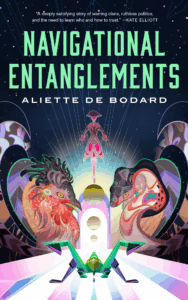
Aliette de Bodard is a favorite in Hugo circles, but while I’ve read three of her previously shortlisted works, she’s an author that’s never really clicked with me. When the short standalone space fantasy Navigational Entanglements hit the Hugo shortlist for Best Novella, I had the opportunity for my fourth try. And while I still have my critiques, I could certainly see the flashes in this one.
Navigational Entanglements is written from two primary perspectives, the autistic-coded navigator from the Rooster clan and the brash, abrasive navigator from the Snake clan. Both use their magic in service of shortcutting long-range space travel in a way that keeps their people safe from the interdimensional tanglers that can destroy entire ships. When a tangler gets loose, a small band of navigators from different clans are called to find it again and keep the surrounding populations from harm.
Navigational Entanglements is a fairly straightforward read from the start, but the setup feels rushed in ways that make it hard to really invest early. Some of this might be personal preference—no matter how many times I say that I hate being thrown into people using their bespoke magic in dangerous situations before I’ve truly invested in the story, authors keep writing books that way, so surely someone out there enjoys it; it just isn’t me. But the characterization feels like an ensemble of people with One Major Trait that keeps the book feeling pretty surface-level. Even when a body drops, I was flipping pages because it was easy and I wanted to see what the hype was about, not because I was genuinely invested in the story.
But a lot of those complaints smooth out significantly in the back half. The secondary characters remain a bit sketchy, but the co-leads get enough depth to start to invest in their stories. The autistic representation from the Rooster clan navigator is particularly well done and plays a major role in the plot development in the second half.
Floating in the background for the first half is the question of why exactly this particular group was sent on such a dangerous mission, and as that subplot unfolds, the story goes from “use magic to defeat a monster, all while dealing with prickly colleagues” into something with a lot more depth. The characters are forced to reckon with the ways in which their interests or convictions diverge from those of their leaders, and even if leadership is mostly off-page, the ways in which the two co-leads respond provides both character depth and a reason to truly invest in the overarching plot. It’s thematically interesting in a way that makes everything around it better.
But that doesn’t mean that every single subplot works. There’s a pretty clear rivals-to-lovers storyline that moves far too quickly, without enough breathing room to be truly compelling. The story—admittedly very short for a novel—would’ve needed a lot more length to make it land. If it was meant to ride the novella/novel boundary line, it’s hard to see much more than rivals-to-friends.
The failure of the romantic subplot and the mediocre first half put a cap on my enjoyment of Navigational Entanglements, to the point that it’s still a little hard for me to imagine why someone would consider this among the very best books of the year. But the themes, characters, and plot all improve enough in the second half that I can start to see glimpses of what others see in de Bodard’s writing, making this the best I’ve read of her work.
Recommended if you like: space xianxia, moral dilemmas.
Can I use it for Bingo? It’s hard mode for LGBTQIA Protagonist, and it also fits Hidden Gem, Author of Color, and Book Club.
Overall rating: 15 of Tar Vol’s 20. Four stars on Goodreads.
